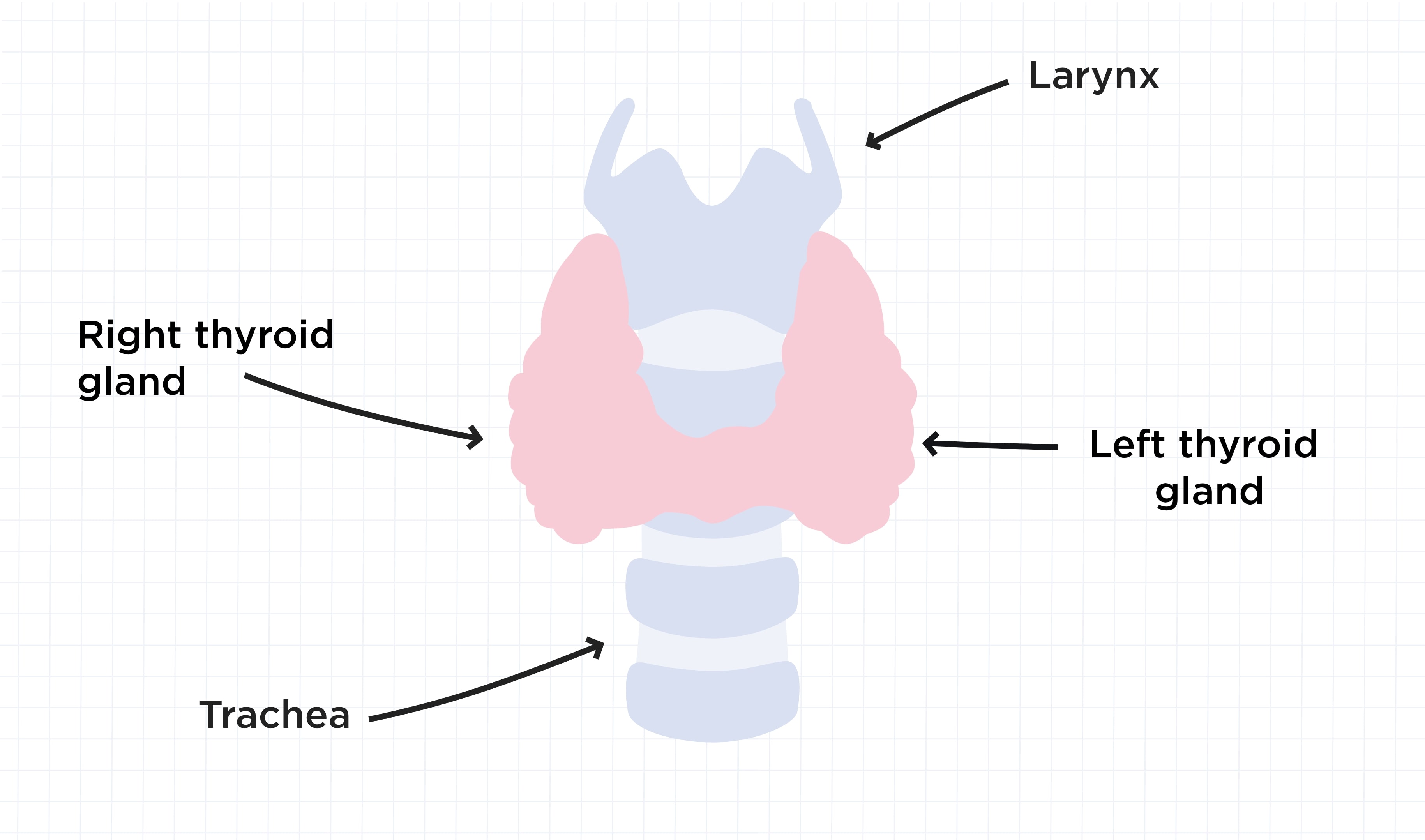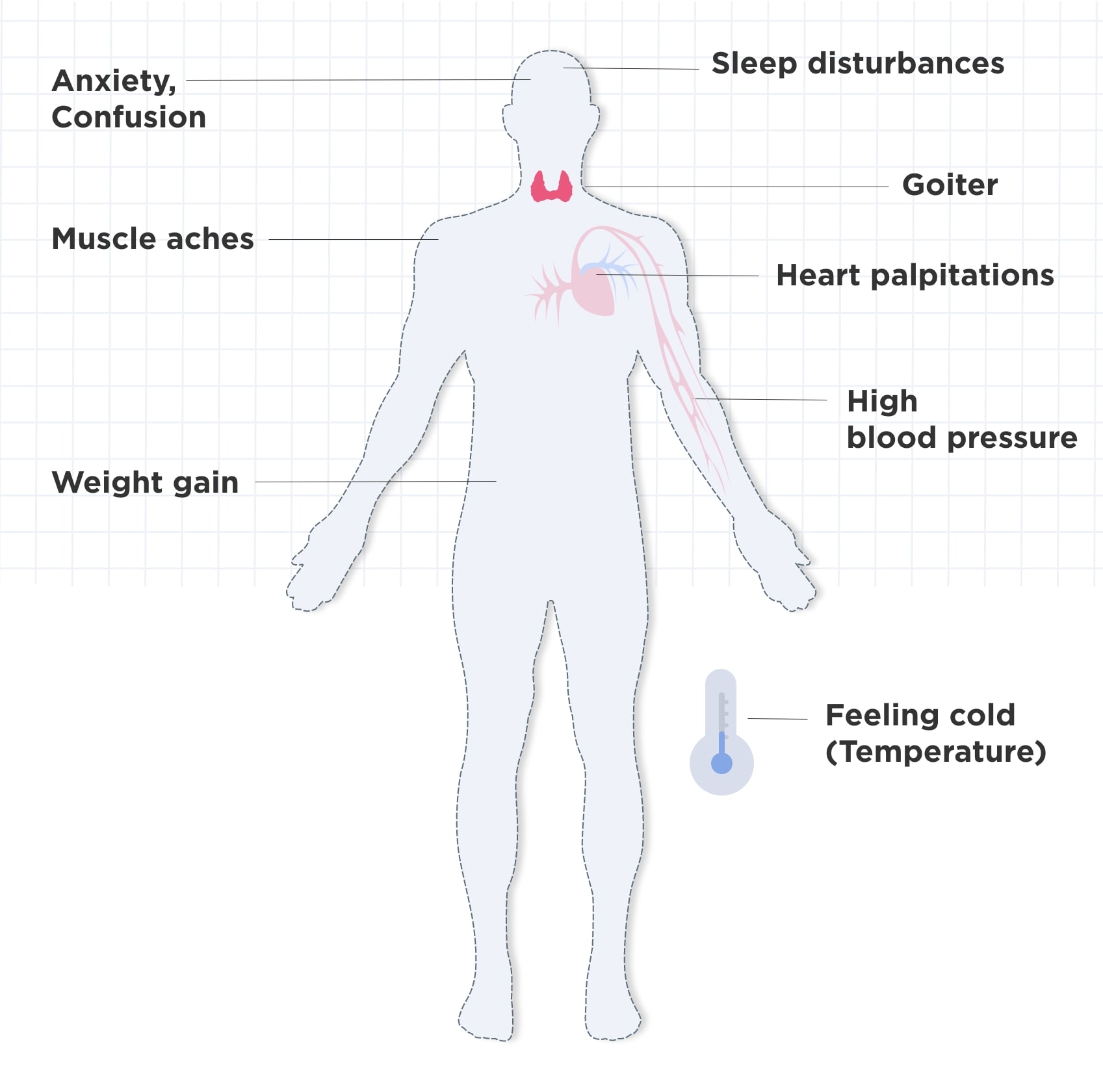
What is BMI? Understanding normal Body Mass Index for men and women
What is BMI? Body Mass Index helps determine if you're underweight, normal weight, or overweight. Learn how BMI works for men and women.
The thyroid gland is small, but it can cause huge changes to your body. Learn more about thyroid hormones, see why hypothyroidism can cause you to gain weight, tips on managing thyroid issues, and what you can do to better regulate your metabolism.
According to Thyroid Awareness, thyroid disorders are estimated to affect up to 30 million people—and more than half of those remain undiagnosed.
Thyroid hormones play a major role in your overall health, including regulating metabolism, body temperature, and appetite. Research has indicated that weight and thyroid issues are related, although the connection is not well understood.
If your body isn’t producing enough thyroid hormones due to hypothyroidism, the resulting slowdown in metabolism may lead to weight gain; in a 2012 article published in European Thyroid Journal, the authors indicate that “small differences in thyroid function are associated with up to 5 kg difference in body weight.”
“Important interaction exists between thyroid function, weight control, and obesity.”
“Thyroid Function and Obesity”, European Thyroid Journal (2012)
Even those with hyperthyroidism—when the body produces too much thyroid hormone, leading to an accelerated metabolism—may experience weight gain after treatment: “Many patients treated for hyperthyroidism experience a gain of more weight than they lost during the active phase of the disease,” according to the researchers.
Learn more about the important role of the thyroid gland and the regulation of metabolism, and how thyroid disorders can affect weight.

The two side lobes of the gland wrap around the trachea and connect at its front.
The thyroid gland is a small endocrine gland located toward the front of the neck. Shaped like a butterfly, the gland creates thyroid hormones, which help regulate metabolism, temperature, and heart rate.
This hormone contains three iodine atoms and comes in two forms: Bound T3, which attaches to proteins, and free T3, which does not.
This hormone contains four iodine atoms and stimulates the consumption of oxygen.
The thyroid gland works with the pituitary gland to release the appropriate amount of hormones into the bloodstream—but it’s just one small part of a complex interconnected system that regulates your body’s metabolism.
Age, gender, and family history are risk factors for thyroid disorders, as is a history of autoimmune disease. According to AARP, the risk of developing hypothyroidism increases with age, and the risk is greatest for women over 50.
Thyroid disorders may be caused by several factors, including autoimmune diseases, iron deficiencies, inflammation, tumors, certain medical treatments, or genetic disorders.
The thyroid hormones T3 and T4 increase your basal metabolic rate. Basal metabolic rate (BMR) is the number of calories your body needs to perform its most basic functions, such as breathing and producing cells. The term is often used interchangeably with resting metabolic rate (RMR), which is different—it’s the number of calories your body uses at rest.
BMR was one of the earliest tests to measure thyroid activity, but most physicians no longer use it because BMR can be affected by other factors.
Are thyroid and obesity related? The relationship between weight gain, metabolism and hypothyroidism is complex and not well understood. That said, weight gain may occur in people with hypothyroidism due to the accumulation of excess salt and water—but only a small amount of weight gain (5-10 pounds) can be attributed to the thyroid.
Whatever the cause, if you’re seeing an unexpected increase in weight, you may want to check with your doctor.
Hypothyroidism can cause several complications, including:
Goiter
This condition causes an abnormal enlargement of the thyroid, and may make it difficult for you to swallow or breathe. Symptoms include a swelling at the base of the neck, or a tight feeling in your throat.
Metabolism changes
As we mentioned, those with hypothyroidism experience a slower metabolism. This may lead to a host of other symptoms and effects, including exercise intolerance—the inability or reduced ability to exercise as you normally would. You may also gain weight and feel tired or sluggish.
Skin and hair problems
Many hypothyroidism symptoms mimic the signs of aging, such as thinning hair and dry, brittle nails.
Reproductive changes
Hypothyroidism affects approximately 0.5% of women of reproductive age. In adulthood, it may be associated with menstrual issues and a lack of ovulation, impairing fertility.
Nerve damage
Hypothyroidism may lead to memory issues and mood swings. If you have depression, it may make you feel worse.
Breathing problems
An enlarged thyroid (goiter) may also cause breathing issues.
In addition to weight fluctuations, if you have a thyroid disorder, you may notice the following symptoms:

Thyroid and sleep disturbances may be related. Because an overactive thyroid can overstimulate the nervous system, those with hyperthyroidism may find it difficult to fall asleep, and if you have hypothyroidism, you may feel cold and sleepy.
Anxiety and thyroid disorders may be related. Thyroid dysfunction may cause psychological effects, such as mood changes or anxiety.
Those with hypothyroidism may not have any appetite, but still gain weight—and hyperthyroidism may cause the opposite: extreme hunger and thirst.
Hypothyroidism may cause cognitive impairments, including memory problems, a lack of focus, and impaired judgment. The symptoms may mimic dementia, and research shows that these cognitive symptoms may improve with treatment.
Blood pressure and thyroid disorders are related. Both hypothyroidism and hyperthyroidism can cause hypertension, or high blood pressure, when the pressure of the blood against your arteries and vessels is consistently too high.
Learn more about high blood pressure +
Heart palpitations, or the feeling of having a “racing heart,” are one of the most common symptoms of hyperthyroidism. Sufferers may experience a heart rate of more than 100 beats per minute, also known as tachycardia.
Thyroid and body temperature are related. Because hypothyroidism can slow down the body’s metabolism, people who have it may frequently feel cold, or have a low tolerance for the cold.
Hypothyroidism can lead to muscle aches, especially in the shoulders and hips, as well as joint pain and stiffness, and those with hyperthyroidism may experience muscle weakness.
Some research indicates that weight loss and thyroid function may be related, and studies have indicated that moderate weight loss may help to stabilize hypothyroidism. But how much?
A 2014 study published in Thyroid examined overweight and obese subjects who underwent a 12-month individualized dietary intervention, using moderate, prolonged dietary restriction, aimed at achieving a weight loss of 5 to 10 percent. The researchers noted that after weight loss, T3 decreased significantly, and “a decrease in peripheral conversion of the prohormone T4 into its hormonally active metabolite T3 is at least in part responsible for the observed changes in thyroid hormone homeostasis.”
If you want to set a realistic weight loss goal, we suggest talking to your doctor. Your healthcare professional can help you set an appropriate attainable long-term goal.
Some people with hypothyroidism have chosen to manage their weight by being mindful about the way they eat, making exercise changes (since people with hypothyroidism are at risk for exercise intolerance or autoimmune flares), and most importantly, to treat these changes as a lifestyle—realistic changes they can keep up on a daily basis.
The American Thyroid Association Task Force suggests the medication levothyroxine as the standard of care to treat hypothyroidism. But are levothyroxine and weight related? Studies have shown that levothyroxine treatment is not associated with clinically significant weight loss: Boston University Medical Center researchers found that only about half of hypothyroid patients lost weight after their hypothyroidism was treated.
Unfortunately, taking the wrong dosage may actually lead to weight gain—as well as more serious consequences, such as higher cholesterol levels, heart disease, and even death.
Thyroid hormones can affect many aspects of your health, and many studies have shown that thyroid and weight gain are related. if you are experiencing what seems like a range of unrelated symptoms, possibly including unexpected weight gain, you may want to see your doctor and request a thyroid test—a simple blood test your physician can analyze to make sure your thyroid hormone levels are balanced, which may help you to control metabolism. If you do have hyperthyroidism or hypothyroidism, it may be treatable with medication.

What is BMI? Understanding normal Body Mass Index for men and women
What is BMI? Body Mass Index helps determine if you're underweight, normal weight, or overweight. Learn how BMI works for men and women.

About weight and blood pressure control
Learn more about the benefits of maintaining a healthy weight to prevent or control high blood pressure.

Body fat percentage: Understanding and measuring body fat
Learn what body fat percentage is, how to measure it accurately, and discover healthy ranges and lifestyle tips to reduce excess body fat.
Join millions of users who are improving their health with Withings. Sign up to discover the entire Withings ecosystem, our latest products, and exclusive offers.
By registering, you agree to receive advertising e-mails from Withings. However, if you change your mind, you can unsubscribe at any time.

